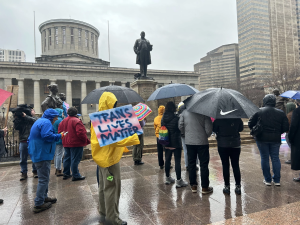
Democratic Justice Jennifer Brunner concurred but wrote, “[T]o suggest that a trial-court judge does not have the power to declare a law facially unconstitutional undermines the central philosophy of why courts exist—to say what the law is.”
Chief Justice Sharon Kennedy concurred with part of the opinion, but the court’s announcement said she “would grant the emergency motion and issue an alternative writ.”
Republican lawmakers passed House Bill 68 last year as the “Ohio Saving Adolescents from Experimentation Act,” to block gender-transition treatments for minors and to ban trans athletes from participating in K-12 and collegiate girls and women’s sports.
It was vetoed by Gov. Mike DeWine, who said going forward with gender-affirming treatments are “gut-wrenching decisions that should be made by parents” and informed by doctors and medical professionals. Republican lawmakers overrode his veto, with one saying that “there is no such thing as gender-affirming care.”
The American Civil Liberties Union of Ohio sued to stop the law on behalf of two 12-year-old transgender Ohio girls and their families, who said HB 68 would end their access to “critical, medically necessary health care.”
“This decision was correct and the state’s request was egregious,” ACLU attorney Freda Levenson said. “Today’s decision preserves the right of families of transgender youth to consult with their physicians to make intimate personal medical decisions themselves, and families will continue to have uninterrupted access to critically important gender-affirming care.”
A spokesperson for Yost said in an emailed statement, “Four Ohio Supreme Court justices share our concern as to whether one judge in a single county should be able to speak for the entire state and overrule the legislature, but they question whether this is the right case for taking up the issue. We’ve got an early trial date, and we’re going to continue to fight for the lawfully enacted statute that Ohioans want.”
Levenson said that’s not what the court decided in this order, but it would be a concern if they eventually ruled a judge couldn’t block a law that the judge determined was likely unconstitutional.
“It’s counter to the history of this jurisprudence in this country if that law were to be enforced against anyone,” Levenson said. “An unconstitutional law doesn’t have any constitutional application.”
The trial on the constitutionality of House Bill 68 is set for July 15 in Franklin County.

